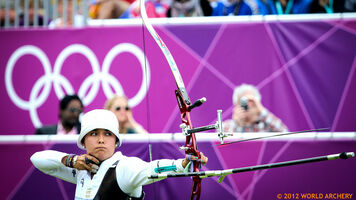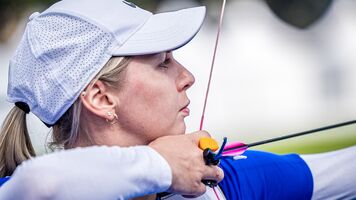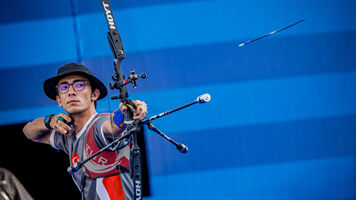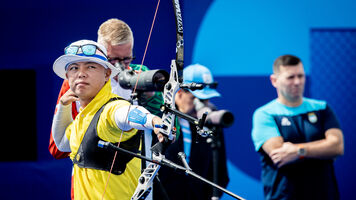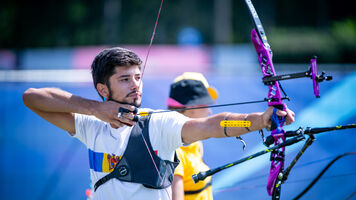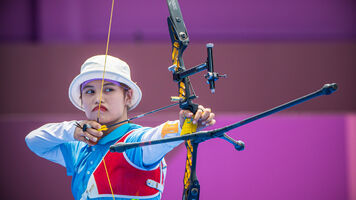Mexico at London 2012 part 2: Aida Roman wins silver – and changes the sport

“Wherever you go, no matter how many championships or cups you have won, the fact that you are an Olympic medallist opens many doors. They don't say ‘World Champion’ or ‘World Cup Final champion’, they say ‘Olympic medallist’.” – Aida Roman
Mariana Avitia and Aida Roman won the first ever Olympic archery medals for Mexico at the London 2012 Olympic Games.
Roman would take the individual silver medal in one of the most exciting – and nailbiting – women’s finals ever seen at an Olympics. Their medals would change the course of the sport at home and across the world.
This is Part 2 - read about Mariana Avitia’s story in Part 1.

Like Mariana Avitia, Aida Roman’s first Olympics was at Beijing 2008, where she won two matches before falling to Kwon Un Sil in the third round.
The loss energised her; she won seven gold medals at the 2010 Central American Games and was part of the team, with Avitia and Alejandra Valencia, who took gold at the 2011 Pan American Games - the first time Mexico had won the event.
She remember a lot of positivity going into 2012, where the same three women would represent their nation. “I remember the whole Mexican delegation went to London with a lot of 'winning' vibes." said Roman.
“That particular administration loved us very much and you could see the affection they really felt for their athletes. They didn't impose goals on you, it was more like they accompanied you so that you could reach your goals. We all connected.”
August 2nd 2012 was the day for the women’s individual finals. “Just before we left the Olympic Village to go to Lord’s, Mariana and I hugged each other and said ‘see you in the semifinal’. From there we went to the dining room, had breakfast, went to the bus stop and from that point on, little-by-little, we focused.”
Roman, seeded 11th, had little trouble making the last eight, where she beat Pia Lionetti to set up the semifinal match with her teammate.
“When I heard that Mariana had won her quarterfinal match I was celebrating on the practice field. It was the most beautiful thing. I said to myself: ‘wow, thank God. You have given us a blessing that two Mexicans are facing each other in an Olympic semifinal’.”
“Everything came together. My first thought was ‘whoever wins is going to do a great job, Mexico has already made history’. When the match started we were both very nervous and were releasing all the stress, all the pressure of just being there.”
“It showed because the scores were a little low at the beginning but I managed to refocus.”

Roman watched Avitia win bronze, but immediately had her own date with destiny, as she walked out onto the turf at Lords to face Ki Bo Bae for the gold medal match.
“Now, it was my turn. Both the qualification and finals field were one of the most beautiful fields that an Olympic venue has ever had. You go out and [see] the huge stadium, lots of people, a great vibe.” she said.
“I enjoyed every arrow. I went all the way and it was a great day. It was one of those days so exciting that sometimes you don't even believe it because of how beautiful it was.”
Given Ki’s dominance of the sport in the 2010s, it’s sometimes easy to forget that she was less than exceptional in the final that defined her career, with the Korean producing ends of 27, 26, 26, 30 and 26.
Roman found enough in the tank to stay with her and force the famous shoot-off, where both archers shot eights, with Roman’s eight just outside Ki’s.
“Initially, I didn't believe it landed there, because I had almost compensated in the 7 almost 6 in the shoot-off arrow, in the tie-breaker. I said 'how did it fall there'. I couldn't believe it. I was a little confused. Before, if you had the same value, you could repeat the shoot-off. But the closest one was the winner.”
“But that was it. Nobody is going to take that silver medal away from you. It wasn't a 6-0, as the Koreans usually win. It was a shoot-off and it gave me a lot of joy and peace of mind that I did not lose until the end.”
“When I was walking towards the podium I said to myself ‘mission accomplished’. That gave me peace of mind, because both Mariana and I accomplished it together. I also remember thinking: ‘I can die in peace.’”
There was a wider bit of history made that day: it marked the first time since the Los Angeles 1984 Olympic Games that Mexican athletes had shared the podium in any Olympic discipline, and the first time it had ever been achieved by two Mexican women.

The London triumph was but a single day, but like most Olympic archery medals, it had long-term ramifications.
But how did it happen? “There are now girls in the national team who say to us; ‘when I was 8, 10 years old, I saw you, I fell in love’.” says Roman.
“We broke the paradigm. People said “how is it possible that Mexicans, Latinas were able to get there? Each one of us had their own school. Mariana came partly from the Chinese school, Alejandra came from Miguel Flores's school and I came partly from the Korean school. The knowledge, experience, aspiration, desire and wishes came together.”
“It wasn't exclusive to the women's team. The magic wand did not just appear in women’s archery. It was an accumulation of work, a joint effort. We were also competing against the men. The level was high.”
“It was not only the archers, but the coaches who were supporting us from the outside; the families who were all very passionate and supporting not obstructing us. We did not have an example to follow. We had no one. A little bit of everything added up and we brought back those two medals. It was something very cool.”

Roman became World Indoor Champion in 2014, and continued to rack up results outdoors, although she would not reach the same heights at the Games again.
“An athlete is always obliged to repeat his or her achievements. I came to the Rio 2016 Olympic Games under a lot of pressure. Too much was demanded, and we all arrived exhausted and, sadly, the results were not so good.”
She would make a fourth Olympic appearance at the beleaguered Games in Japan. “At Tokyo 2020 I was much more relaxed, but the vibe felt very strange in empty stadiums.”
Still an active part of the Mexican squad, Roman was a part of the team that took a bronze medal at the Berlin 2023 Hyundai World Archery Championships.
But her legacy, along with Avitia, was maybe best seen in the performances in Paris – where Roman returned to the Olympics once again, this time working as a commentator for Mexican TV.
“The current generation, like Matias Grande, bring a lot of desire to make it. They bring a lot of aspirations, not only to go to the Olympic Games but also to do something important.”
“We are starting to generate technical hybrids that are favouring the Mexican gene. It's kind of starting to reflect more on our roots, how we are, how we work, how a Mexican archer's body works. I believe that we will see great aspirations, but we need to be patient.”
Roman’s medal is stored at her parent’s house, after an earthquake in 2017 made her fear that she would lose it forever. “I gave the medal to them. I didn’t want my memories to be gone in a building. So my parents have my World Championship and Olympic Games medals in a little box in a glass cabinet.”
With thanks to Guille Garcia.







